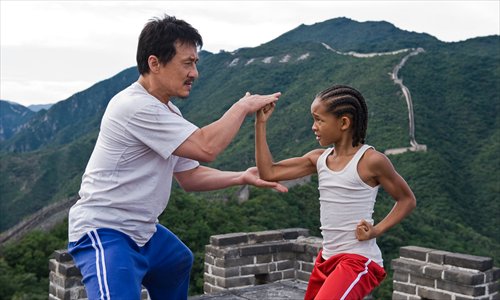The bigger picture

A scene from The Karate Kid
While Chinese film celebrities are increasingly visible on red carpets at festivals across the world, it hasn't been to accept awards. One after another, the Chinese film industry has watched its recent domestic hits fail to draw audiences or acclaim overseas. A poster for Journey to the West: Conquering the Demons Photos:CFP
According to the authoritative 2012 report on Chinese film export by the Academy for International Communication of Chinese Culture (AICCC) at Beijing Normal University, 75 of the country's total 893 domestically-produced films over the past year were exported to more than 80 countries.
And compared to the heaping 17.1 billion yuan ($2.8 billion) in domestic box-office earnings, overseas figures only amounted to 1.1 billion yuan, a drop of 48 percent from the 2 billion yuan over the previous year.
"The dissemination of Chinese films overseas in 2012 saw few highlights, and it's worrisome," said Huang Huilin, director of the AICCC.
The degree of how earnings have regressed over the years is made clearer when coupled with a drop of 43 percent in overseas box-office revenues between 2010 and 2011, lows not seen since 2005.
Still kung fu fighting
There was a time when Chinese films shined on the international stage. During the 1980s, Zhang Yimou, Chen Kaige, Feng Xiaogang and other fifth-generation Chinese directors dominated the festival circuit with such films as Yellow Earth (1985) and Red Sorghum (1988). Their work was met with critical acclaim among foreign audiences - Zhang's Red Sorghum was awarded the Golden Bear at the 38th Berlin International Film Festival in 1988.
Fifth-generation directors told stories of a nation just emerged from the turbulence of the Cultural Revolution (1966-76). "The novelty and mystery of the themes attracted foreign audiences, especially film experts," Huang told the Global Times.
But the glory years didn't last. After the late 1980s, Chinese films disappeared from the world's awards ceremonies for a decade, only to reemerge with blockbusters such as Crouching Tiger, Hidden Dragon (2000, Ang Lee) and Hero (2002, Zhang Yimou).
Even today, the most commercially successful Chinese film overseas is still Crouching Tiger, Hidden Dragon, with $128 million in box-office receipts from the North American region alone.
However, recent attempts to tap into the foreign market have been met with disappointing results, with year's domestic hits seeing paltry earnings overseas. Lost in Thailand, the low-budget comedy that cashed in a record 1.26 billion yuan at the Chinese box office in 2012, only brought in $60,000 in North America. A similar flat reception was given to Journey to the West: Conquering the Demons, which had earned 1.24 billion yuan in China last year.
The bigger picture is that last year over 15 Chinese films screened in North America, eight of which brought in an average of $100,000, with Love and Back to 1942 topping the list with under $300,000.
For now it seems that kung fu films are still the most popular genre of Chinese film. According to a 2010-2011 AICCC report, the most well-received Chinese films among foreign audiences were all based in martial arts, such as The Karate Kid, Ip Man 2, Bodyguards and Assassins, and The Flying Swords of Dragon Gate.
"For foreign audiences, kung fu is magical, but above all, they don't need to read subtitles to understand the film, which is a very important factor given the current quality of translations," said Huang.

As the world's second-largest film market and ranking third in film production, China offers fertile ground for movie makers. At the annual Fortune Global Forum in Chengdu, Sichuan Province this June, Jeffrey Katzenberg, CEO of US-based DreamWorks Studios, remarked that in five years time China will surpass the US to become the world's largest film market.
The confidence of foreign professionals in China's market doesn't stop with praise. Recent US-China co-productions such as Man of Tai Chi, Iron Man 3 and Looper, all integrate characters and plot points that directly cater to Chinese audiences.
Domestic companies are also purchasing international theater chains to have greater say in the film market, such as the Dalian Wanda Group's (DWG) acquisition of AMC in 2012, the US' second-largest theater chain. This September, a gala celebrating the opening of DWG's $8.2 billion film industry zone in the coastal city Qingdao attracted Hollywood celebrities such as Nicole Kidman and Leonardo DiCaprio.
But despite these achievements, still none match international the success of Chinese films during the 1980s and early 2000s.
Bottom line, storyline
According to Janet Yang, a Chinese-American film producer, cultural and language barriers can turn a domestic hit into an international flop.
"Telling Chinese stories in a way that is easy for foreign audiences to understand is still an unsolved problem for Chinese directors," said Yang, who encourages more filmmakers to live abroad in order to better learn how to reach foreign audiences.
While many Chinese film industry professionals see Hollywood co-productions as a shortcut to world audiences, judging from their recent performance at the box office both at home and abroad, they also have their drawbacks.
"Many of them fail because they merely mix money, stars and marketing," said Yin Hong, vice president of School of Journalism and Communication at Tsinghua University.
"[Because] the bottom line is telling a good story, and doing it well," added Huang of the AICCC.